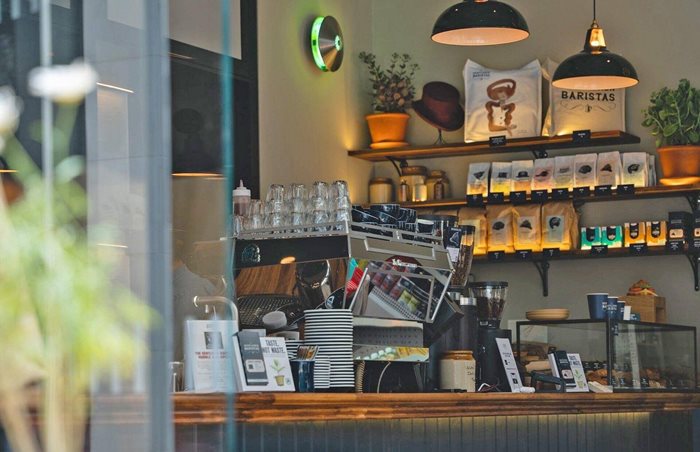With many coffee shops still regaining momentum following the pandemic, soaring energy costs present a major challenge for operators already grappling with high inflation and reduced consumer spending
.jpg.aspx?lang=en-GB&width=700&height=394)
Photo credit: Omer Sonidu
Energy bills have been hitting doormats with a thud over the last 12 months. For hospitality businesses still reeling from the pandemic, the soaring cost of keeping the lights on means many are facing another significant challenge in 2023.
Energy costs were already rising following the pandemic as manufacturing and heavy industry restarted around the world, leading to soaring demand. According to industry advocate UKHospitality, hospitality businesses in the UK have seen energy costs rising as a percentage of turnover from 5% to 18% over the last three years.
Russia’s invasion of Ukraine in February 2022 piled further pressure on energy supply, particularly for European nations heavily reliant on Russian oil and gas. In 2020, Russia supplied around 29% of crude oil and 43% of natural gas imports into the EU, with eastern European countries, Germany and Italy, most heavily reliant.
For consumers and businesses, the impact of disrupted energy supplies from Russia was profound. Between 23 February, the day before the conflict began, and 31 July, European gas and electricity wholesale prices increased by 115% and 237% respectively.
“We need to prepare for the fact that it’s never going to go back to the way it was with very cheap oil and gas”
Murielle Gagnebin, Project Leader, Agora
As a result, hospitality businesses across Europe are seeing energy overheads become increasingly unsustainable. UK Hospitality data shows energy costs for UK hospitality businesses rose by an average of 238% in 2022. Despite wholesale prices coming down and stabilising in 2023, energy costs continue to rise.
“We surely are in an energy crisis,” says Murielle Gagnebin, Project leader for European-French energy policy at Agora, a think tank developing scientific and political methods to create sustainable and carbon-neutral energy solutions across Europe and globally.
“We need to prepare for the fact that it’s never going to go back to the way it was with very cheap oil and gas.”
A perfect storm
Konstantinos Konstantinopoulos is CEO of Coffee Island, which operates more than 480 coffee shops across Greece, Cyprus, UK, UAE, Canada, Switzerland, Egypt and Romania. He observes many hospitality businesses lack the financial reserves to deal with high energy costs on top of inflation, reduced consumer footfall and spending power following the pandemic.
Energy costs at Coffee Island stores in Greece have risen from around €400 a month to as much as €1,500 in some cases.
“We don’t have the fat to deal with that,” he says, adding that profitability at many outlets has been severely diminished.
“We have to deal with the higher cost of running a store. But at the same time, consumers have less money, or due to inflation, their money has less value now. So, we cannot increase our prices to make a significant profit.”

The Gentlemen Baristas in Marble Arch, London | Photo credit: Courtesy of The Gentlemen Baristas
One solution has been to harness Coffee Island’s economy of scale to help individual franchisees negotiate energy contracts at the corporate level. “In the case of energy costs, it’s better to deal with Coffee Island as a system and not as individual stores,” he says.
Henry Ayers, Co-Founder & Wholesale Director at The Gentlemen Baristas, a nine-strong specialty coffee shop and roastery, saw energy costs at one of his sites quadruple in 2022. On top of that, raw materials costs have also risen sharply, exacerbated by the strength of the dollar against the pound.
“There’s not one supplier that hasn’t increased their prices in some way,” he says.
“Green coffee is one of our biggest worries. It’s traded in dollars, so when the pound tanks against it, the knock-on effect is massive. The cost of green coffee has increased by around 40-50%, so that does mean passing on price increases to consumers.”
With many hospitality businesses still grappling with reduced store footfall following the pandemic, the stage has been set for an incredibly challenging year ahead.
“Revenues at our retail sites are already down and Monday-Friday trade has not returned to pre-pandemic levels. That’s put a huge pressure on our sites to just break even,” he says.

Konstantinos Konstantinopoulos, CEO, Coffee Island | Photo credit: Coffee Island
Are energy giants cashing in on crisis?
Despite the ongoing war in Ukraine, wholesale gas prices have eased as European nations sought alternative supplies and built up reserves over the course of 2022. Data from industry body Gas Infrastructure Europe showed 83.2% of EU gas storage capacity was filled in December 2022.
The UK’s day-ahead gas contract traded at around 158p per therm in January 2023 – almost back to pre-Ukraine war levels – compared to more than 500p per therm in mid-August.
Yet, most businesses have yet to reap the benefits of more stable wholesale energy prices towards the latter half of 2022, with many now finding themselves trapped in unsustainably high energy contracts and variable rates increasingly difficult for businesses to obtain.
“There’s not one supplier that hasn’t increased their prices in some way”
Henry Ayers, Co-Founder & Wholesale Director, The Gentlemen Baristas
Light bulb solutions
Navigating the complex web of energy supplier contracts, negotiating hard and deploying economies of scale are some of the solutions that operators have found to limit the damage of soaring energy costs.
Greater efficiency could also be part of the solution, says Agora’s Gagnebin, who identifies incremental energy savings as currently the cheapest way for hospitality businesses to reduce costs. She urges businesses to evaluate energy-intensive equipment, such as roasters and espresso machines, to see if newer, more efficient models could be deployed. Even small changes, such as improving insulation, ensuring doors are not left open and turning down thermostats can add up to real savings.
“If you save one degree, you save about 7% of your energy bill for heating, which is significant at the current prices,” she says.
“In the case of energy costs, it’s better to deal with Coffee Island as a system and not as individual stores”
Konstantinos Konstantinopoulos, CEO, Coffee Island
Henry Ayers can attest to the power of energy savings, with The Gentlemen Baristas’ new Loring S35 coffee roaster 80% more fuel efficient compared to conventional models.
“Despite the challenges of this year especially with the rising energy costs, we are still expanding,” he says.
However, with oil and gas companies making billions in profits during Europe’s energy crisis, there is clearly scope for more government intervention to support small businesses at the sharp end of market volatility. Anglo-Dutch oil giant Shell saw profits double to a record $40bn in 2022 on the back of soaring gas and oil prices, yet paid just $134m and $520m under UK and EU windfall tax schemes.
Such additional income will prove vital in extending government support for households and businesses in the year ahead. The UK’s Energy Bill Relief Scheme, a wholesale gas and electricity price cap for non-domestic customers, is due to expire at the end of March 2023 and will be replaced by the scaled-back Energy Bills Discount Scheme, which will see hospitality business receive a discount on wholesale energy prices – a move UKHospitality says will cost the segment £4.5bn.
One thing is for sure, without further government support to rein in excessive profits in the energy industry, hospitality businesses across Europe, particularly smaller operators, face being left out in the cold when it comes to the soaring cost of keeping the lights on.
This article was first published in Issue 14 of 5THWAVE magazine.
Subscribe to 5THWAVE to receive each edition in print and digitally or sign up to our newsletter and be the first to read the latest articles and updates on World Coffee Portal research.
